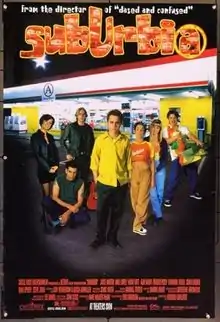SubUrbia (film)
SubUrbia is a 1996 American comedy-drama film directed by Richard Linklater and written by Eric Bogosian, based on his play of the same name. It follows the relationships between a few young adults as they spend their time standing on "the corner" outside a local convenience store.
| SubUrbia | |
|---|---|
 Theatrical release poster | |
| Directed by | Richard Linklater |
| Produced by | Anne Walker-McBay |
| Screenplay by | Eric Bogosian |
| Based on | SubUrbia by Eric Bogosian |
| Starring |
|
| Music by | Stewart Copeland |
| Cinematography | Lee Daniel |
| Edited by | Sandra Adair |
Production company | |
| Distributed by | Sony Pictures Classics |
Release date |
|
Running time | 120 minutes[1] |
| Country | United States |
| Language | English |
| Box office | $656,747[2] |
Bogosian based the story on his own experiences growing up in Woburn, Massachusetts, a suburb of Boston. The convenience store setting is based on the 7-Eleven in the "Four Corners" section of the west side of Woburn, and the high-school fight song that is sung in one scene is the actual Woburn High fight song ("Black and Orange" to the tune of "On Wisconsin").
Plot
Three years out of high school in the fictional Burnfield (filmed mainly in Austin, Texas), four friends are in the daily habit of hanging out drinking by the garbage dumpster of a corner convenience store, occasionally taunting the foreign-born store owner/operator, married couple Nazeer and Pakeesa. The film's main character, Jeff, is an aimless soul unsure of his future since dropping out of college. Jeff is dating Sooze, a student at the local community college who plans to leave Burnfield and study visual arts in New York City. Jeff's best friends are Buff and Tim. Tim, recently honorably discharged from the Air Force, is a troubled heavy-drinker with a knack for shooting off his mouth. Sooze's friend Bee-Bee is a recovering alcoholic who hangs out with the group one evening.
This particular evening, the group are expecting a visit from a high school friend, Neil "Pony" Moynihan, lead singer for Dreamgirl, a rock band that is on a stadium tour. Dreamgirl performed in Burnfield that night, but the gang could not afford tickets. Pony arrives with Erica, Dreamgirl's publicist. Erica reveals how excited Pony has been about seeing the gang and most of the group is glad to see him, although some of them are bitter and jealous of his recent success. As the expanded group hangs out beside the store, their actions and conversations show that they all are contemplating what they want to do with the rest of their lives. By the end of the night, Bee-Bee is in medical trouble after drinking an entire bottle of hard liquor. Buff has slept with Erica and is going to Los Angeles to shoot a Dreamgirl music video. Sooze has left town with Pony. Tim has been arrested and released, and Jeff is berated by Nazeer for "throw(ing) it all away".
Cast
- Jayce Bartok as Pony
- Amie Carey as Sooze
- Nicky Katt as Tim
- Ajay Naidu as Nazeer
- Parker Posey as Erica
- Giovanni Ribisi as Jeff
- Samia Shoaib as Pakeesa
- Dina Spybey as Bee-Bee
- Steve Zahn as Buff
Actors Samia Shoaib and Steve Zahn reprise their roles from the original stage production (1994) at the Mitzi E. Newhouse Theater.[3] In the stage play, the character of Nazeer was named Norman.[3]
Soundtrack
| Suburbia: Original Motion Picture Soundtrack | |
|---|---|
| Soundtrack album by various artists | |
| Released | February 7, 1997 |
| Label | Geffen Records |
In addition to existing songs by various artists heard during the film, Sonic Youth composed and performed new songs for the film. The film's score was composed by Stewart Copeland.
- "Unheard Music" – Elastica & Stephen Malkmus
- "Bee-Bee's Song" – Sonic Youth
- "Bulletproof Cupid" – Girls Against Boys
- "Feather in Your Cap" – Beck
- "Berry Meditation" – U.N.K.L.E.
- "I'm Not Like Everybody Else" – Boss Hog
- "Cult" – Skinny Puppy
- "Does Your Hometown Care?" – Superchunk
- "Sunday" – Sonic Youth
- "Human Cannonball" – Butthole Surfers
- "Tabla in Suburbia" – Sonic Youth
- "Hot Day" – The Flaming Lips
- "Psychic Hearts" – Thurston Moore
- "Town Without Pity" – Gene Pitney
Reception
The film earned a ranking of 65% on Rotten Tomatoes from 23 reviews. The site's consensus states: "SubUrbia succeeds in its blistering, ensemble-driven exploration of middle America, though it never quite reconciles the disparate stylings of director Richard Linklater and writer Eric Bogosian."[4] Roger Ebert gave the film a positive review giving the film 31⁄2 stars out of 4, calling it "dark, intense and disturbing".[5]
Awards
Ajay Naidu was nominated for Best Supporting Male at the 1997 Independent Spirit Awards but lost to Jason Lee.
References
- "SUBURBIA (18)". British Board of Film Classification. 1997-04-09. Retrieved 2013-05-06.
- SubUrbia at Box Office Mojo
- "subUrbia Who's Who: April 20 - August 28, 1994". Lincoln Center Theater. Retrieved 2017-12-10.
- subUrbia at Rotten Tomatoes
- "SubUrbia Movie Review & Film Summary (1997)". Chicago Sun-Times. 1997-03-07.